One thing that’s clear, reading through the press briefings and interviews given by returning members of Gen. Stanley McChrystal’s 60-day strategic review, is that the situation on the ground in Afghanistan is depressingly alarming or alarmingly depressing, take your pick. Both Andrew Exum and Stephen Biddle are in the “hard but not hopeless” camp, but came back with more of the former than the latter to report. And Anthony Cordesman, whose real-time thinking comes out in paragraph form, was downright brutal in his assessment of where things stand. Cordesman thinks the war is winnable, but that we must come to […]
Afghanistan Archive
Free Newsletter
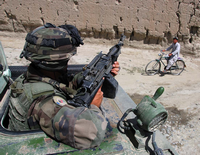
WARDAK, Afghanistan — They used to call Afghanistan “the forgotten war.” They should rename it “the long war.” Not only because it’s been going on for eight years now, but because it’s going to have to go on even longer if the West is to achieve even measured success in this broken country. Wardak province, just west of the capital, Kabul, where I’ve spent the last three weeks with the U.S. Army’s 10th Mountain Division, illustrates this perhaps even more powerfully than the country’s more war-ravaged areas in the south. For Wardak is not such a terrible place. This is […]
I raised this question in relation to Iraq and the Surge in January 2007. Sam Roggeveen applies it to Afghanistan, with perhaps even better effect: I wonder how convincing such arguments would beif we weren’t inAfghanistan already. Would we now advocate an invasion and long-termoccupation of Afghanistan to stabilise the Indian Ocean region, reducethe chances of nuclear conflict between India and Pakistan, disruptdrug supplies, protect energy sources, substitute for the lack of aregional security framework anddiscourage Pakistani cooperation withthe Taliban? More to the point, have any of these problems been reducedor made more manageable by the Western presence in Afghanistan? […]
I just wanted to call your attention to the interview I conducted with Andrew Exum, a.k.a. Abu Muqawama. Andrew just got back from a month in Afghanistan, where he took part in Gen. stanlye McChrystal’s 60-day strategic review. He took some time out of a busy morning to talk freely and openly about his impressions on the war, including some fo the hard challenges and difficult decisions facing the U.S. military and policymakers. Here’s what he had to say when asked what one thing Americans need to know about the war in Afghanistan: The thing that I would say is […]
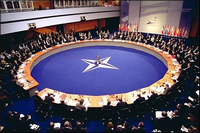
NATO officially launched the process of revamping its Strategic Concept this month. As of now, the alliance’s next mission statement is “a blank sheet of paper,” in the words of outgoing Secretary General Jaap de Hoop Scheffer. But NATO’s recent pronouncements and current challenges offer plenty of guidance on how to fill the page. First, NATO nations must invest more in defense, and they must remember that theirs is, above all, a military alliance. As the secretary general observed, military operations are “NATO’s core business.” The U.S. spends about 4 percent of its GDP on defense, but only four other […]
After returning from Afghanistan as part of his participation in Gen. Stanley McChrystal’s 60-day review of Afghanistan strategy and operations, Anthony Cordesman of the Center for Strategic and International Studies briefs the press on his view of the current state of the war. An excerpt: “When we talk aboutwinning, we are not talking about transforming Afghanistan into somemirror image of the West or accelerating to the point where it becomesa developed country within the foreseeable future. We’re talking aboutbasic security, basic stability, basic economic opportunity for theAfghans and creating a country which will be free of internationalterrorism.“ Related: This WPR […]

Andrew Exum is a fellow at the Center for a New American Security, and author of the influential counterinsurgency blog Abu Muqawama. He just returned from a month in Afghanistan, where he took part in recently appointed U.S. and Coalition commander Gen. Stanley McChrystal’s 60-day review of strategy and operations. He graciously agreed to talk with WPR Managing Editor Judah Grunstein about his impressions from his trip. The views expressed here are his own, and do not reflect any U.S. government or military position, nor the views of the CNAS. The following is an edited and abridged transcript of the […]
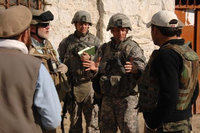
Last February, the office of the Special Inspector General for Iraq Reconstruction published a comprehensive 456-page historical analysis of the Iraq reconstruction experience entitled, “Hard Lessons.” The IG, Stuart Bowen — who was there from the beginning, assuming the post actually before the invasion — was kind enough to send me a copy this week. Having now read it, I must say it’s an incredible piece of data collection and analysis, even if, in my opinion, its concluding optimism about the U.S. government’s recent efforts to better prepare itself for the next “Iraq” — already upon us in the form […]

The 10th Mountain Division has recently deployed to Afghanistan’s Wardak province in an effort to apply U.S. counterinsurgency tactics to the region 30 miles west of Kabul. Although security has improved since they arrived, American and Coalition efforts still face significant challenges. Insurgent attacks, mainly mortar and roadside explosive devices, remain a threat. The performance of Afghan police and army units — a central component of U.S. and Coalition strategy — is markedly improved but still leaves much to be desired. And winning the trust and allegiance of Afghan villagers, in particular among the Pashtun, is a daily struggle, often […]
If you’re wondering why the U.S. is turning a blind eye to reports of irregularities in the Kyrgyz presidential election, and so eager to arrange Russian transit routes for Afghanistan supply logistics, this Deirdre Tynan article for EurasiaNet on the disappointing initial results from the recently negotiated Central Asian land routes — known as the Northern Distribution Network — is a good place to start: In June and July, according to publicly available data, only sevencontainers a day on average were arriving in Afghanistan via the NDN. Acommercial source, speaking on condition of anonymity, characterizedthe performance as “ridiculous.” Railway experts […]
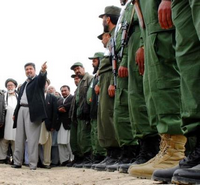
Editor’s note: Balint Szlanko’s WPR Photo Feature that accompanies today’s reporter’s notebook can be found here. WARDAK, Afghanistan — It was always going to be hard to get the Afghans — and especially the Pashtuns, the ethnic base of the Taliban — to cooperate with the corrupt and incompetent Afghan government in Kabul. One of the biggest tests, perhaps, is the effort to get people to join the recently established Afghan Police Protection Force (APPF), an armed neighborhood watch that is being piloted in Wardak province, before it is extended to other parts of the country. Setting up and arming […]
We tend to think of the war in Afghanistan in terms of its impact on American power, and even for the implications it will have for NATO as an out-of-theater alliance. But here’s a thought: What if the most significant impact of the Afghanistan War is to soothe Germany’s fraught relationship with the use of “hard power”? If so, then a major joint operation launched this week — in which 300 German troops supported 1,200 Afghan soldiers with heavy arms and mortar, light-armored vehicles and air support — marked a turning point. The operation is Germany’s first offensive military campaign […]
Six months after he ascended to the presidency of the United States, Barack Obama can point to a distinct new tone in American foreign policy and the start of a discernible makeover of the country’s image around the globe. When it comes to specific achievements in the international arena, however, the administration does not have much to show, so far. The transformation of America’s global standing had already started even before the president moved into his new Pennsylvania Avenue address on Jan. 20. Two factors triggered the process. First, Obama replaced a man who had become extraordinarily unpopular throughout most […]
Lots of attention given to this initial Obama-Gates victory over Senate pork on the F-22. Less to the Gates announcement that the Army will temporarily add 22K troops over the next three fiscal years. For everyone keeping score at home, that’s on top of the 65K for the Army and 27K for the Marine Corps already budgeted for, which itself is on top of the transformation of the Army Reserve (205K) from a strategic reserve to an operational reserve. That’s a lot of extra boots that are, one imagines, meant to be put on the ground.Max Bergmann is a good […]
The NY Times reports that Pakistan is less than keen about the latest Marine offensive in southern Afghanistan, and I think Rob over at Arabic Media Shack has a pretty useful takeaway: Manyin America, especially inside the COIN community, have becomefrustrated with Pakistan lately, wondering why they “don’t get it,” andwon’t develop their own Counter-Insurgency to take out pro-Talibanelements inside Pakistan. It’s quite simple actually: Pakistan and theU.S. do not have mutual interests in this case.Can we just admit this? I’d add that Pakistan and the U.S. do not share a common perception of Pakistan’s interests in this case. And […]
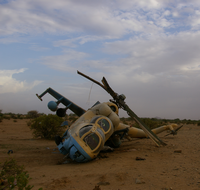
A 30-ton Mi-26 helicopter, operated on a NATO contract by the Moldovan firm Pecotox Air, was hovering with a load of supplies near the town of Sangin in southern Afghanistan on July 14, when Taliban fighters fired on it with a rocket-propelled grenade. The crew of an accompanying helicopter saw the rocket sheer off the Mi-26’s tail boom, causing it to crash. All six Ukrainian crew members on board died, as did an Afghan boy on the ground. Less than a week later, on July 19, a civilian Mi-8 operated by a Russian company crashed at the NATO base in […]
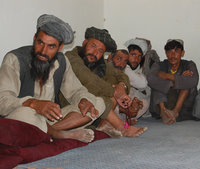
WARDAK, Afghanistan — The most frustrating part of this war is not the fighting. In fact, there isn’t so much of that, besides the roadside bombs and the occasional mortar or rocket attack. The hardest bit is to convince the Afghans — especially the Pashtuns, formerly the main backers of the Taliban regime — that the coalition wants to offer its help, and can protect those that accept it. What usually happens is this: A platoon of U.S. soldiers turns up in a village, inquiring if its inhabitants need anything — jobs, medicine, more security, or even a new bridge […]
